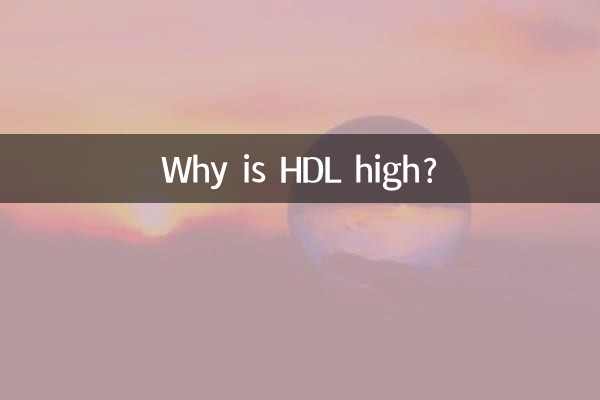Why is HDL high?
In recent years, with the improvement of health awareness, more and more people have begun to pay attention to blood lipid levels. High-density lipoprotein (HDL) is a representative of "good cholesterol". Does high levels mean health? This article will give you a detailed analysis based on the hot topics and structured data in the past 10 days across the Internet.
1. Basic concepts of high-density lipoprotein (HDL)

HDL is a lipoprotein primarily responsible for transporting cholesterol from the blood to the liver for metabolism, thereby reducing the risk of atherosclerosis. It is often thought that higher HDL levels are better, but is this really the case?
| HDL level classification | Value range (mg/dL) | health risks |
|---|---|---|
| On the low side | <40 (male) <50 (female) | Increased risk of cardiovascular disease |
| normal | 40-60 (male) 50-60 (female) | cardiovascular protection |
| On the high side | >60 | There may be no additional benefit or even potential risks |
2. Reasons for high HDL
High HDL may be related to the following factors:
1.genetic factors: Some people have naturally high HDL levels due to genetic mutations.
2.lifestyle: Regular exercise and moderate drinking (such as red wine) may increase HDL.
3.drug effects: Certain lipid-lowering drugs (such as statins) or hormone drugs may increase HDL.
4.disease state: Hyperthyroidism, chronic liver disease and other diseases may be accompanied by abnormal HDL.
| Influencing factors | Specific performance | suggestion |
|---|---|---|
| genetics | familial hyperHDLemia | Regular monitoring without excessive intervention |
| sports | Aerobic exercise can increase HDL by 5-10% | Maintain moderate exercise |
| drinking | One glass of red wine a day may raise HDL | Control the amount of alcohol you drink and avoid overdosing it |
3. Is there anything to worry about if HDL is high?
Although HDL is known as the “good cholesterol,” too high an HDL level (such as >80 mg/dL) may be associated with the following problems:
1.Abnormal function: The "quality" of HDL is more important than the "quantity", and the lipoprotein function of some people with high HDL may be impaired.
2.inflammatory response: Extremely high HDL may indicate chronic inflammation or autoimmune disease.
3.research controversy: Recent studies have found that the cardiovascular risk of people with extremely high HDL may not decrease but increase.
4. How to deal with high HDL?
1.comprehensive assessment: Combined with LDL, triglyceride and other indicators to comprehensively judge blood lipid status.
2.Functional testing: Evaluate HDL function through experiments such as cholesterol reverse transport ability.
3.lifestyle adjustments: Avoid over-reliance on a single indicator and maintain a balanced diet and exercise habits.
| Check items | normal range | abnormal meaning |
|---|---|---|
| HDL-C | 40-60 mg/dL | If it is too high, it needs to be analyzed in conjunction with other indicators. |
| LDL-C | <100 mg/dL (ideal) | Key indicators of cardiovascular risk |
| Triglycerides | <150 mg/dL | Too high indicates metabolic abnormality |
5. Latest opinions of experts (hot spots in the past 10 days)
1.European Journal of Cardiology: People with very high HDL should be screened for apolipoprotein A1 gene mutations.
2.American Heart Association: Emphasize that HDL "functional detection" is more meaningful than pure numerical values.
3.Social media buzz: #好cholesterol is also dangerous if it is too high# The topic has been read more than 2 million times.
Summary: High HDL needs to be treated rationally. It is recommended to assess the overall cardiovascular risk through professional examinations and avoid blindly pursuing the optimization of a single indicator.

check the details

check the details